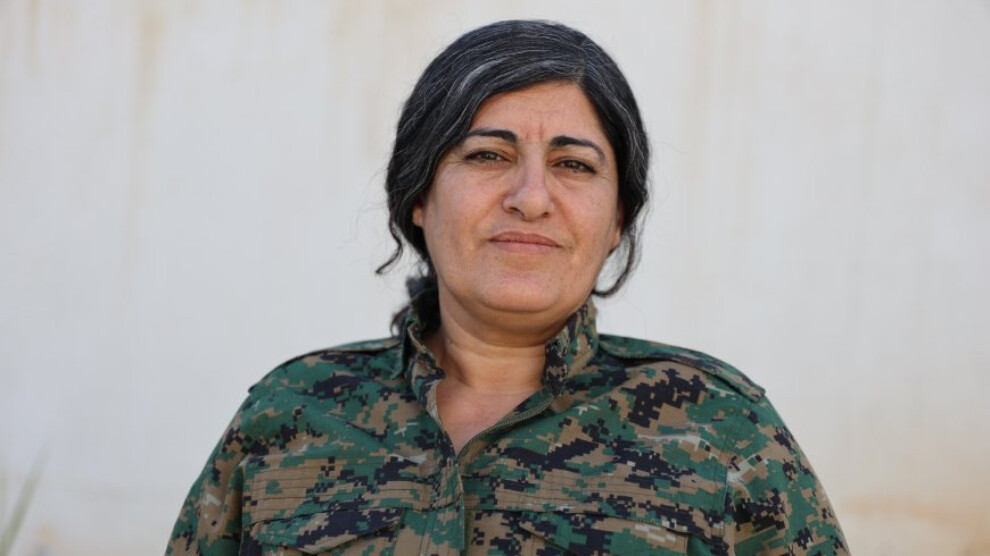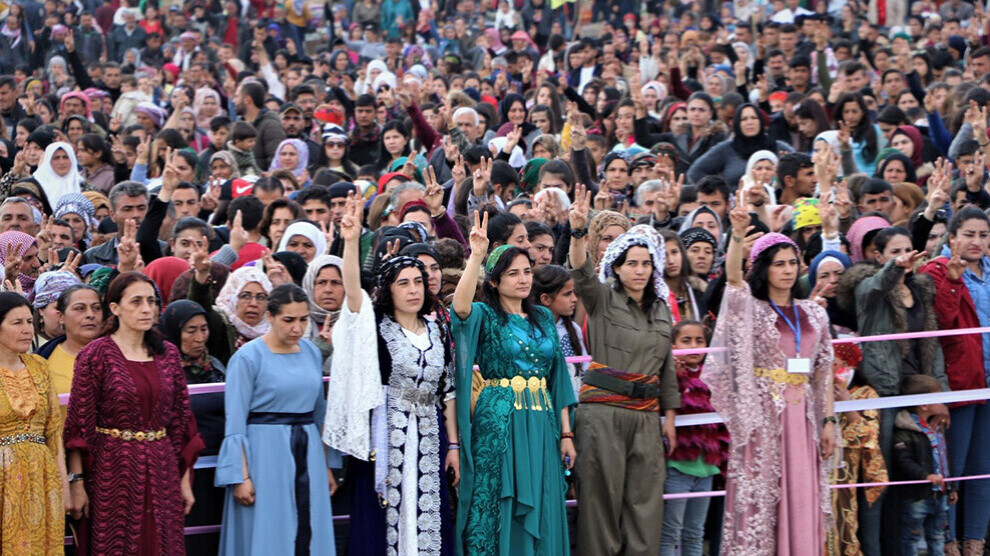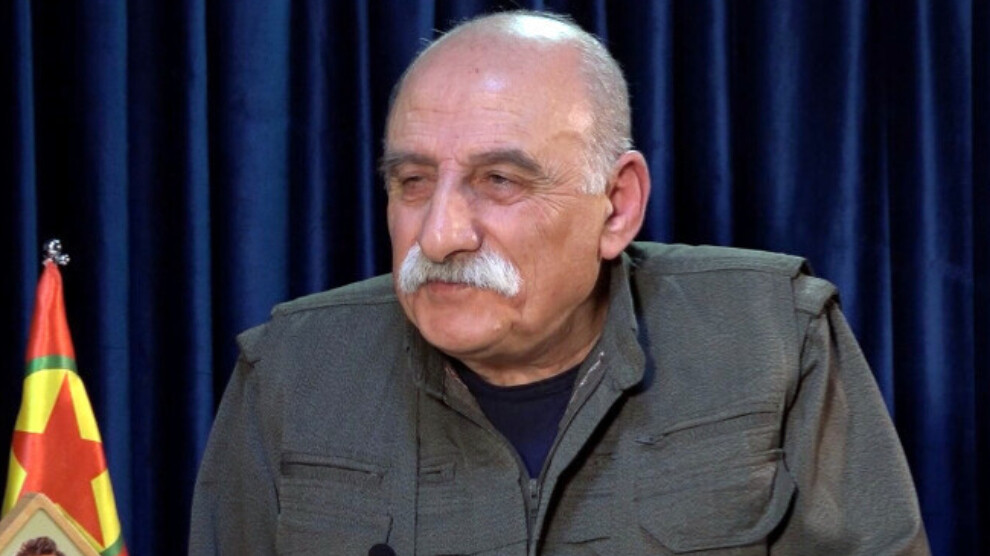YPJ Commander Leyla Waşukanî emphasised the importance of the Kurdish women's revolution and struggle and said that women should fight against male-dominated systems in an organised and courageous way.

ANF
NEWS DESK
Monday, 25 November 2024, 18:38
Leyla Waşukanî, one of the commanders of the Women's Protection Units (YPJ), spoke to ANHA about the Kurdish women's revolution and resistance.
Commander Leyla Waşukanî drew attention to the policies of the male-dominated system against women and the resistance of women and said, “First of all, it should be noted that we are faced with a system prevailed by a male-dominated mentality. This system united against the order of the goddess woman, set games and intrigues, and built its cruel order by realising the first conspiracy in history. It is a fact that women and children suffer the most in wars and conflicts. Today, humanity is experiencing the peak of the third world war. In Kurdistan, the Middle East and all over the world, humanity is being abused and the existing conflicts are being fuelled. In the face of these attacks, resistance and a unique struggle is absolutely necessary. Every day we witness the murder of women in society. This is a result of the special war waged by the capitalist nation-state and the small state mentality that is its continuation. At this point, the duty of women is to organise against this system and its dirty war. This is only possible through revolution.”
Referring to the women's revolution, the Rojava Revolution, Leyla Waşukanî said the following: “When the war in Rojava started in 2012, Kurdish women participated in revolutionary activities with all the means at their disposal. When the spark of the war was lit, they organised themselves, took the front lines and fought heroically. They were brave and determined; they stood shoulder to shoulder with men against the most dangerous forces in the world and wrote epics of heroism. This struggle of women influenced everyone. So much so that even brutal gangs such as ISIS were afraid of women and had to say, ‘Women with red shoes (Jinên pêlav sor) are not afraid and will not back down’. This stance of women has been a great source of pride and honour for all of us.
It was the resounding struggle of these brave Kurdish women fighters that led to the Rojava Revolution being recognised as a women's revolution. Even in the harshest conditions, women took on their roles and formed the basis of moral strength and enthusiasm. Women's struggle became a place of respect and admiration. The sacrificial and warrior women's labour has become the legacy of libertarian women's freedom to organise for the future and to build a confederal and democratic society.
We must remember this: Nothing is won for nothing. Sacrificial fighters are needed for an equal and free future. Today, women can proudly and confidently say, ‘We exist and we want our freedom’. As Leader Apo (Abdullah Öcalan) said, ‘If the woman is not liberated through her labour, the man will never be liberated; he will remain a slave.’ Therefore, women must be confident in themselves, grow on their labour and achieve freedom.”
Leyla Waşukanî emphasised the courage of Kurdish women and continued: “The epic heroism of Kurdish women is in front of the eyes of the whole world and this struggle still continues with determination. Kurdish women are known for their relentless courage, pride and self-confidence. From pioneers such women from Dersim, Besê and Zerîfe to Sara, Bêrîtan, Zîlan, Sema, Ezîme, Zinarîn, Meryem, Zehra, followed by Arîn Mîrkan, Rêvan Kobanê, Avesta Xabûr and many more heroic women sacrificed their lives for the sake of their people, their land and their freedom. No matter how great physical and life difficulties women faced, they never backed down or complained. Even in the most difficult moments, they put up resistance without hesitation and reached the highest rank in the struggle for freedom. Kurdish women bravely took part in the front lines and have always been the main force of resistance and struggle.
If women's revolution is being talked about today, this is not just a discourse, but the result of the resistance of women on the battle fronts. The resistance of women on the battle fronts was decisive for the Rojava Revolution to be recognised as a women's revolution. With their courage and sacrifices, women have gained respect. The struggle of Kurdish women in the Rojava Revolution can never be denedi, because this struggle has resonated all over the world and cannot be overshadowed by any dominant mentality.”
The YPJ commander also mentioned the leadership of women in the Kurdish uprisings and said: “Women have always played a pioneering role in Kurdish uprisings and revolutions. Today, young women such as Şervîn, Reyhan, Rojna, Leyla, Jiyan, Sara, Rûken and finally, Kurdish woman Asya Elî, have become the stronghold of resistance and revenge in the heart of Ankara, the capital of Turkey, with the art of guerrilla struggle. Leader Apo says the following about the Kurdish resistance fighter Bêritan Hêvî: ‘In Barzani's war in 1992, weak people like Osman could not resist and surrendered to the enemy. However, the heroic Bêritan did not surrender, she resisted the betrayers. When Gülnaz Karataş, that is Bêritan, ran out of bullets during the battle, she smashed her gun and jumped from Lêlkan Hill in Xakûrkê in order not to fall into the hands of those who sold her.' In Rojava, there were women like Barîn Kobanê; they heroically resisted in order not to fall into the hands of the enemy. Barîn was fully focused on her goal and fought against the gangs until her last breath and joined the caravan of martyrs. Similarly, Avesta Xabûr also fell a martyr with honourable resistance. The struggle of Kurdish women has become a source of inspiration for all women.”
Leyla Waşukanî emphasised that the revolutionary women's struggle had a great impact on all societies and added the following: “The leadership of women in the Rojava Revolution has been a source of inspiration for all women and revolutionary and libertarian forces. Dozens of young women joined the ranks of the revolution and took part in the war. Women were seen as cowards in society. However, it should not be forgotten that Leader Apo persuaded women to stand up, and this in itself is a revolution; it is almost as if it was created out of nothing. Women sacrificed their lives to protect women and society. As we all know, YPJ was founded on this basis and grew day by day. YPJ pioneered all the moves in the Rojava Revolution and continues its struggle with determination.”

MSD: The struggle to end violence against women is an inseparable part of our fight
MSD calls on the international community, human rights organizations, and feminist movements to intensify their efforts to support Syrian women and expose the practices and violations they face, whether by oppressive regimes or occupying forces.

ANF
NEWS DESK
Monday, 25 November 2024
The Syrian Democratic Council (MSD) released a statement marking the International Day for the Elimination of Violence Against Women.
Remarking that November 25th carries significant meaning in the global women's struggle for freedom, dignity, and equality, MSD pointed out that this year’s commemoration comes amidst the rise of systematic violence and gender-based discrimination in various regions around the world.
The statement also shed light on the plight of Syrian women who, it said, are enduring highly complex conditions due to the ongoing war since 2011. “The war has exacerbated various forms of violence and discrimination, including poverty, marginalization, severe abuses such as torture, killing, and enforced disappearance. These conditions are particularly dire in areas under Turkish occupation and its affiliated mercenaries, where severe violations against women are systematically committed.”
The MSD attributed the rise in violence against Syrian women to the dominant patriarchal culture, discriminatory laws, and the devastating consequences of the bloody conflict. It stressed that this painful reality "requires a serious stance from all of us to struggle for change and promote equality."
In the context of women's struggle against all forms of violence, the MSD saluted the resilience of Syrian women and their continuous fight for freedom and democratic change. It stressed that empowering women and guaranteeing their rights is not only a humanitarian issue but also a fundamental condition for achieving peace and sustainable development in Syria.
The MSD called on the international community, human rights organizations, and feminist movements to intensify their efforts to support Syrian women and expose the practices and violations they face, whether by oppressive regimes or occupying forces.
The MSD also urged all Syrian women to unite and work together to align their visions and goals, collaborating to end the violence practiced against them. The MSD stressed that women's participation in the political process and decision-making is not a secondary demand but a necessity for the success of any sustainable political solution in Syria.
The MSD reiterated that "women's freedom is the key to the freedom of society as a whole, and the struggle to end violence and discrimination against them is an inseparable part of our fight to achieve justice and dignity for all Syrians."






